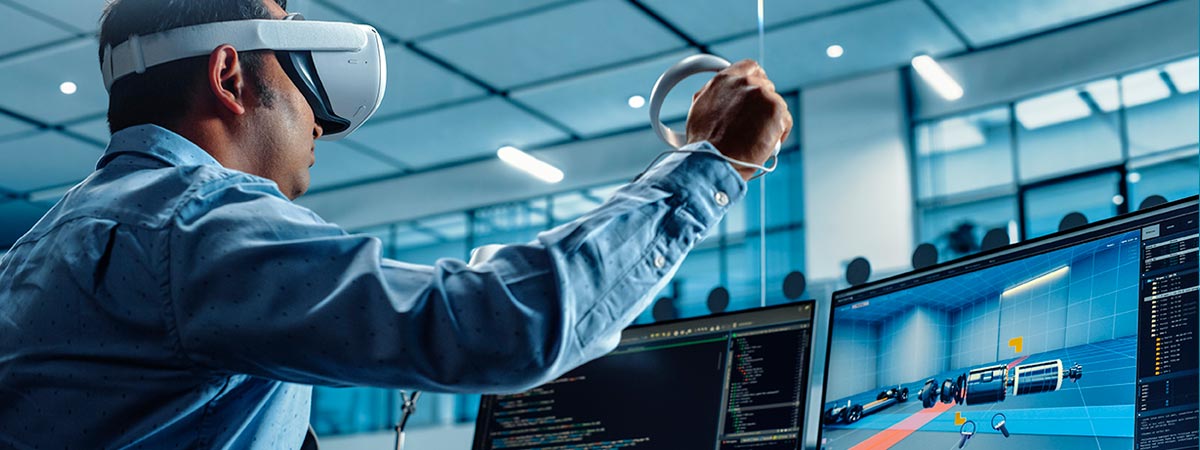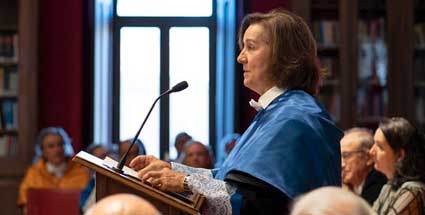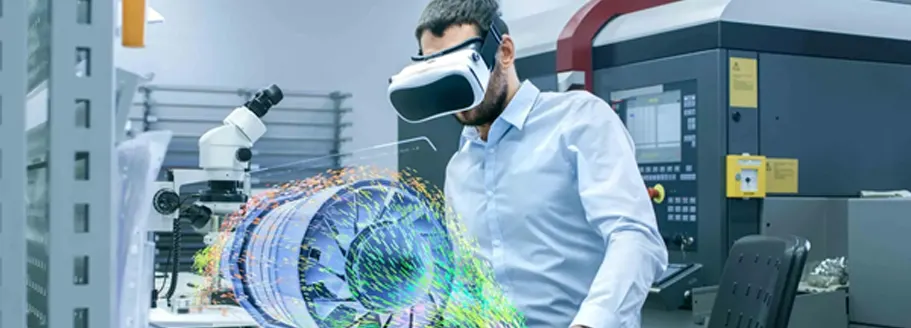Master’s Degree in XR and Immersive Environments for Engineering

Empowering professionals to lead the digital transformation through immersive technologies
The Master’s Degree in Continuing Education in XR and Immersive Environments for Engineering provides hands-on training in XR tools, with a strong focus on technological innovation and practical solutions for fields such as engineering, architecture, and healthcare, among others.
With a transversal and multidisciplinary approach, the program equips professionals to meet the demands of Industry 4.0 and the challenges of ongoing digital transformation.
Students will gain expertise in development platforms such as Unity and Unreal Engine, learn to operate cutting-edge hardware including Meta Quest 3 and Apple Vision Pro, and explore optimization techniques for creating scalable and efficient immersive applications.
Characterized by its strong industry connections and focus on the latest real-world technologies, the program emphasizes a practical, innovation-driven approach. Graduates will be prepared to lead in the development and application of XR technologies across global and cross-sector environments.
Why study the Máster en XR y Entornos Inmersivos en Ingeniería
Preparation for Emerging Roles in Industry 4.0
Do Something Unique in XR y Entornos Inmersivos en Ingeniería
If you want to do something unique in life, start at university..
If you want to transform the world, start with a unique education at Nebrija University.
Comprehensive Focus on XR Technologies Applied to Industry 4.0
This master’s degree not only trains students in XR technologies (virtual, augmented, and mixed reality), but also applies them directly to the most innovative processes in Industry 4.0, such as advanced simulation, digital twins, and mixed reality in industrial settings.
Complete Mastery of the XR Workflow
The master’s degree not only trains students in leading tools such as Unity and Unreal Engine, but also deepens their understanding of the comprehensive workflow for XR projects. Students learn to enrich these environments with optimized 3D elements, using specialized software such as Blender, Maya, or standards like OpenXR, to ensure the highest quality and performance across applications.
The program trains experts in the creation of highly optimized 3D content, from modeling and texturing to rendering, using tools and techniques that maximize efficiency and compatibility across a wide range of devices and platforms. This skill ensures that graduates can develop XR solutions that run smoothly on both high-end systems and affordable hardware.
Preparation to Face Challenges with Customized Solutions
Beyond virtual and augmented reality, the program teaches students to meet the challenges of Industry 4.0 with scalable and adaptable technical solutions. This includes the creation of accurate simulations, functional prototypes, and immersive environments applied in sectors such as engineering, architecture, and healthcare.
Focus on Innovation and Social Impact
The program promotes the creation of innovative solutions that have a tangible impact on society and business. It encourages an ethical and critical approach to technology, exploring its implications for privacy, sustainability, and the human experience.
Skills to Lead Global Digital Transformation
The master’s degree positions graduates as leaders capable of facing global challenges, with advanced competences in XR project management and a strategic vision to drive digital transformation in any sector or region.
Curriculum
Students must complete a total of 60 ECTS credits
First Semester 30 ECTS
From October to January , inclusive- 6 ECTS | Introduction to Immersive Reality: History, Evolution, and XR Technologies
- 6 ECTS | XR Hardware and Software
- 6 ECTS | 3D Modeling and Design in Virtual Spaces Supported by AI
- 6 ECTS | Narrative, User Experiences, and Interfaces (UX/UI) in Extended Reality
- 6 ECTS | Simulation and Physics in XR Environments
Second Semester 30 ECTS
From January to June, inclusive- 6 ECTS | XR Project Management in Engineering
- 6 ECTS | Augmented Reality Applied to Engineering
- 6 ECTS | Programming for Augmented and Virtual Reality
- 6 ECTS | Mixed Reality and Its Application in Industry 4.0
- 6 ECTS | Master’s Final Project
More Academic Information
Official Degree:Master’s Degree in Continuing Education in XR and Immersive Environments in Engineering
Students of the Master’s Degree in Immersive Technologies Applied to Engineering are passionate about technological innovation and the potential of virtual, augmented, and mixed realities to transform sectors such as engineering, architecture, healthcare, education, design, and marketing. This master’s degree is open to graduates from a wide range of disciplines who want to specialize in immersive technologies, bringing together creativity and analytical thinking. These students are driven to lead disruptive projects in digital environments, offering practical and scalable solutions to the challenges of Industry 4.0. They are professionals prepared to thrive in a constantly evolving global market.
60 créditos.
Minimum of 12 ECTS credits and maximum of 60 ECTS credits per enrollment and academic period.
435 hours.
Center responsible:Higher Polytechnic School
Branch of knowledge: Industrial and Automotive Engineering Area
Places available: 50
Type of Education: Hybrid
Languages: Spanish
Academic year in which it was implemented: 2025-2026
Duration: 1 year. From October to June
University Services: [+info]
Competences
General Knowledge and Content- Training in the application of XR technologies (virtual, augmented, and mixed reality) to address technical and creative challenges.
- Understanding of 3D design workflows and tools, resource optimization, and advanced simulations.
- Knowledge of open standards such as OpenXR and WebXR to ensure interoperability across platforms and devices.
- Training in the integration of immersive technologies within industrial, architectural, and healthcare environments.
- Proficiency in leading development tools such as Unity, Unreal Engine, and 3D modeling software including Blender and Maya.
- Understanding and application of advanced simulation techniques and digital twin creation for Industry 4.0 environments.
- Knowledge of cutting-edge immersive hardware such as Meta Quest 3 and Apple Vision Pro, and its application in real-world projects.
- Ability to design custom XR experiences tailored to the needs of specific sectors including marketing, education, and advanced manufacturing.
- Apply immersive technologies to develop practical, scalable solutions across multidisciplinary sectors.
- Design and optimize workflows by integrating XR design, development, and project management tools.
- Solve complex problems using advanced simulations and efficient 3D modeling.
- Develop XR projects from concept to implementation, generating tangible and impactful outcomes.
- Ability to lead the integration of immersive technologies into industrial and creative processes to maximize efficiency and reduce costs.
- Understanding of the ethical, legal, and social implications of implementing XR technologies.
- Capacity to adapt and innovate in rapidly evolving technological environments, developing sustainable and future-oriented solutions.
- Design and execution of XR simulations applied to real-world scenarios in engineering, architecture, and healthcare.
- Development of virtual environments and 3D models optimized for immersive hardware platforms.
- Creation of interactive narratives and immersive user experiences aligned with business and user needs.
- Management of XR projects using a practical, multidisciplinary approach, integrating diverse and collaborative teams.
- Development of an original and innovative project in immersive technologies that applies the full range of skills acquired during the program.
- Presentation and defense of the project before a university panel, demonstrating both technical expertise and effective communication skills.
Hybrid Study
MethodologyProject-Based Learning (PBL)
Project-based learning is an ideal methodology for this program, as real-world projects and simulations are essential for mastering XR technologies. It allows students to work on projects that simulate the types of challenges they will encounter in the industry. Through PBL, students acquire not only technical skills but also project management, leadership, and teamwork competencies, key abilities in any multidisciplinary environment.
Justification: Given the program’s strong connection to industry and practical application, this methodology facilitates the direct transfer of knowledge to real situations. Projects integrate tools such as development engines (Unity, Unreal Engine), XR hardware, and core concepts of simulation and modeling.
Collaborative Learning
Collaborative learning is essential in immersive technologies, where disciplines like engineering, design, computer science, and social sciences converge. Forming multidisciplinary student teams replicates real-world industry dynamics and fosters greater innovation in project development.
Justification: The program includes projects that demand both technical and creative skills, making it ideal for collaboration among students from diverse academic backgrounds. Moreover, immersive technologies themselves enhance interaction and collaboration in both physical and virtual environments.
Flipped classroom
In this methodology, students review theoretical content—such as lectures or instructional videos—on their own outside of class, while classroom time is devoted to practical exercises, problem-solving, and project work. This is especially beneficial for the more technical modules of the master’s degree, such as programming in Unity and Unreal Engine. Students can learn foundational concepts independently, then apply them in class with instructor support.
Justification: Technical modules involving complex tools require significant hands-on learning. The flipped classroom model maximizes in-class time for applied practice, while giving students the flexibility to absorb theoretical content at their own pace.
Immersive Simulations
Immersive simulations are not only a subject of study, but also a teaching tool that allows students to experience how XR can address real-world challenges in sectors like engineering and architecture. Students can work within simulated XR environments, designing, interacting, and collaborating directly in immersive spaces.
Justification: Simulations are central to XR technologies, allowing students to engage with complex scenarios that require the application of both technical knowledge and problem-solving skills—reinforcing the program’s strong emphasis on practical training.
Given the master’s degree’s focus on hands-on learning and technological innovation, the proposed methodologies are designed to maximize interaction, collaborative work, and the direct application of knowledge. Approaches such as Project-Based Learning, Collaborative Learning, Experiential Learning, and the Case Study Method ensure that students develop not only technical competencies, but also the essential soft skills needed to manage XR projects in real-world contexts. These strategies align perfectly with the multidisciplinary and practical nature of the program and support its core objective: preparing students to lead digital transformation through XR.
A hybrid format is the most suitable structure for this master’s degree:
- Flexibility: The hybrid format is ideal for working professionals, allowing them to balance their job responsibilities with their academic training. At the same time, it provides recent graduates the opportunity to engage in face-to-face learning with peers and professors while completing more theoretical components online.
- Combining Face-to-Face Learning with Technology: XR technologies require significant in-person learning, particularly for hardware handling and immersive simulations using advanced devices (VR headsets, AR glasses, motion capture systems, etc.). However, theoretical content—such as ethical, legal, or conceptual frameworks—can be delivered effectively through online sessions.
- Efficient Use of Time: Hands-on and lab-intensive sessions can be concentrated in on-campus blocks, while theory classes, project monitoring, and tutorials can be held online. This reduces travel demands and helps students manage their time more efficiently.
Proposed Distribution of the Hybrid Format:
- 50-60% online: Theoretical classes, development of conceptual content, discussion of case studies, tutoring, and project monitoring.
- 40-50% Face-to-face: : Lab work, immersive simulations using XR hardware (VR headsets, AR glasses, 360° cameras, haptic devices), and practical project development.
Calendar and Schedules
Calendar
Calendario académicoSchedules
Afternoon Schedule (Monday to Thursday):
- Session length: 3–4 hours per day (between 17h and 21h), which enables professionals to attend after work.
- Frequency: 3 to 4 days per week.
- Advantages::
- Students can attend after their workday, making the master’s program accessible to professionals.
- It avoids overload by not scheduling intensive sessions every day, allowing time for reflection and independent work between classes.
Weekend Schedule (Friday and Saturday)
- Friday: 4 hours (from 16h to 20h)
- Saturday: 6 hours (from 9h to 15h).
- Advantages:
- Ideal for professionals who cannot commit to a Monday-to-Friday schedule.
- Concentrating classes over two consecutive days allows students to apply what they have learned immediately in the workplace.
- Makes it easier to plan intensive blocks of practical sessions.
Schedule Alternatives (for greater flexibility)
- Online classes during the week (theory, tutorials, and case studies) + in-person practical sessions on Saturdays for topics that require hardware handling or collaborative lab work.
- Intensive in-person blocks: One or two intensive in-person weeks distributed throughout the semester for practical topics that require continuous use of devices and simulations.
Admission
Admission Requirements
- Current Regulations: : Admission is governed by Royal Decree 822/2021, which establishes the general guidelines for the organization of official university education.
- Recommended Admission Profile Applicants are recommended to have a strong interest in technical and scientific fields, along with teamwork skills, initiative, and creativity. A good level of reading comprehension and written expression in Spanish is essential for academic success.
- 5% of places reserved for students with disabilities: The university guarantees accessibility and adapts its procedures to support students with special educational needs.
- Accessible information systems and reception procedures for students with specific educational needs: From the first contact, resources and detailed support are provided to ensure proper integration into the university environment.
- Admission Tests: The evaluation is based on the applicant’s academic record (60%), a personal interview (30%), and a personal presentation document (10%). These tests are designed to assess the student’s potential and motivation for the chosen program.
- Reserving a Place: Once the admission tests have been successfully completed, students must pay a fee to reserve their place at the university. This payment secures their place in the selected academic program.
- Enrollment Formalization: The enrollment process includes submitting the required documentation, completing self-enrollment through the university’s web platform, and paying the applicable academic fees. Students must complete this process before the start of classes.
- Enrollment Modification: Students may modify their enrollment until the start of classes. In exceptional circumstances, the Dean may authorize changes after this date, provided that certain conditions are met, such as the availability of places and maintaining the minimum number of students in the affected groups.
- Credit Recognition: Credit recognition is carried out in accordance with current regulations and allows students to validate credits from previous studies, facilitating their academic progress within the program.
Employability
Career Opportunities
Upon completing the Master’s Degree in Continuing Education in XR and Immersive Environments in Engineering, students at Nebrija University will be prepared to pursue careers in a wide range of innovative and high-demand fields:
- XR Application Development: Design and program immersive experiences using advanced tools like Unity and Unreal Engine, applied to sectors such as engineering, architecture, healthcare, and entertainment.
- Simulation and Digital Twins: Create high-precision virtual models to optimize industrial processes, from prototype design to real-time operations monitoring and improvement.
- Immersive Marketing and Advertising: Develop innovative campaigns using augmented and virtual reality, creating interactive experiences that enhance consumer engagement and business communication.
- XR Project Management: Lead multidisciplinary teams in the implementation of immersive technologies in international projects, ensuring effective and scalable results.
- Immersive Technology Consulting: Advise companies on integrating XR solutions to improve workflows, optimize resources, and deliver high-value experiences.
The master's program's practical and multidisciplinary approach equips graduates to meet the demands of a global labor market. It positions them as forward-thinking professionals, capable of applying immersive technologies across various sectors, transforming business processes, and boosting organizational competitiveness. This degree opens the door to a wide variety of professional opportunities in a rapidly evolving industry.
More Information on Internships in CompaniesYour Master’s Degree in XR and Immersive Environments for Engineering
Launch of the Autonomous Vehicle Project
FEM Expert and Nebrija University are combining cutting-edge engineering with fields such as computer science, ethics, psychology, and legal frameworks related to essential vehicle certification in this cross-disciplinary project.
Mathematics and Physics in the Digital Age
This session explored the challenges and opportunities for mathematicians and physicists in the digital era, the interdisciplinary nature of innovation and technology, and the launch of new degree programs in Applied Mathematics and Applied Physics (including double degree options) at Nebrija University’s Higher Polytechnic School.
Masterclasses with Leading Experts in Our Classrooms
- Matrix Product States for Quantum Computing
Mari Carmen Bañuls - The Quantum Walk Algorithm
Vivian Kendon - Simulation and Functional Matrices
Hernan Indibil - Superconducting Qubits
Juanjo Garcia
- The DWave Computing model
Victoria Goliber - Quantum Error Handling: Color Code
Miguel Ángel Delgado - Quantum from the Business Perspective
Jose Camacho - Quantum Machine Learning & AI
Franck Zickert
Nebrija Quantum Connection
In its commitment to education and its students, Nebrija University organized the Nebrija Quantum Connection, an event featuring leading experts in quantum computing in Spain. Companies such as INDRA, LANTIK, Amazon, Multiverse, Quasar, BBVA, ATOS, and QUSIDE participated, helping to promote awareness and showcase the state of the sector in Spain.
Graduation Ceremonies | POSTGRADUATE STUDIES
On June 16, 17, and 18, we will celebrate the graduation of the Class of 2022, coinciding with the 5th centenary of Antonio de Nebrija.
Investiture Ceremony: Carlos López-Otín, Doctor Honoris Causa
Nebrija University awarded biochemist Carlos López-Otín the title of Doctor Honoris Causa on Friday, November 18, in a ceremony held at the Graduation Hall of the Madrid-Princesa Campus. Cristina Garmendia—president of the Cotec Foundation, PhD in Biological Sciences, and former Minister of Science and Innovation—served as sponsor.
Welcome Events for the 2022-2023 Academic Year
Nebrija University hosted Welcome Days for new face-to-face bachelor's students from September 7 to 9, 2022. During these sessions, students were introduced to the university, faculty, departments, facilities, and fellow classmates who will be part of their academic journey.

Pilar Vélez Shares Her Passion for Mathematics at the Opening Ceremony of the 2022-2023 Academic Year
Passion filled the atmosphere at the opening ceremony held at the Madrid-Princesa Campus. It was evident in the words and gestures of the academic speakers and especially in the inaugural lecture—Passion for Mathematics: From Great Discoveries to the Discovery of Theorems—delivered by Pilar Vélez Melón.
See article








